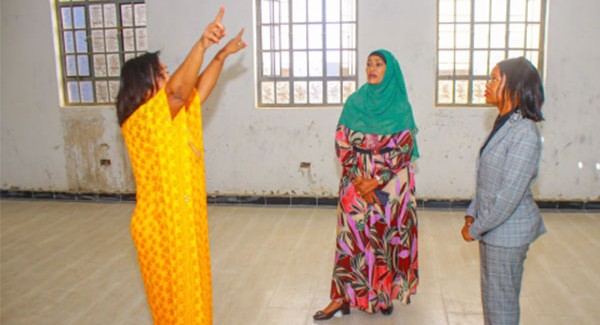NGEC and Nairobi County Join Forces to Establish Landmark Safe House for GBV Survivors
Commission Chair Hon. Jaldesa and Nairobi County Woman Representative Hon. Esther Passaris Lead Inspection of New Facility
Nairobi, Kenya – In a groundbreaking initiative to combat Gender-Based Violence (GBV) and support survivors, the National Gender and Equality Commission (NGEC), led by Chairperson Hon. Rehema Jaldesa joined Nairobi County Woman Representative Hon. Esther Passaris in inspecting the ongoing construction of a first-of-its-kind safe house in Nairobi County. This state-of-the-art facility aims to provide immediate refuge, psychosocial support, and pathways to justice for survivors, reinforcing Kenya’s commitment to eliminating GBV and promoting gender equality.
A Beacon of Hope for GBV Survivors The new safe house, strategically located within Nairobi, is designed to offer survivors a secure environment where they can receive medical care, counselling, legal aid, and skills training to rebuild their lives. With cases of GBV on the rise, the project underscores the urgent need for safe spaces that not only provide emergency shelter but also serve as a centre for empowerment and rehabilitation.
Hon. Passaris, a staunch advocate for women's rights, reaffirmed her office’s dedication to ensuring that survivors of violence receive the care and support they need.
“This safe house represents a significant step towards protecting survivors, offering them a chance to heal, and reintegrating them into society with dignity,” she stated.
Speaking at the site, Hon. Jaldesa emphasised the Commission’s unwavering commitment to working with Nairobi City County and other key stakeholders to strengthen protections for survivors and address the root causes of GBV.
She called for a holistic, multi-sectoral approach, integrating law enforcement, healthcare services, and community-based interventions to create a sustainable impact. “The fight against GBV requires coordinated efforts across all levels of government, civil society, and the community. We must ensure survivors not only find refuge but also receive the justice and support they deserve,” Hon. Jaldesa asserted.
While the establishment of the safe house marks a significant milestone, stakeholders emphasised the need for continuous investment in GBV prevention and response mechanisms.
Hon. Jaldesa urged national and county governments, private sector actors, and civil society organisations to join forces in raising awareness, supporting survivor-centred initiatives, and strengthening legal frameworks.
Community engagement remains central to the success of such interventions. By addressing cultural and societal norms that perpetuate GBV, Kenya can create an environment where women, children, and all vulnerable groups feel safe and protected.
As the safe house nears completion, optimism is high that it will serve as a model for similar initiatives across the country. With NGEC, the Nairobi County Government, and Hon. Passaris’s office leading the charge, the project signals a future where survivors of GBV can access safety, justice, and a pathway to recovery.
Through strengthened partnerships, policy implementation, and community-driven solutions, Kenya moves closer to a society free from gender-based violence—one where equality, dignity, and human rights prevail.
Nairobi County Woman Representative, Hon. Esther Passaris, and NGEC Chairperson, Hon. Jaldesa, inspect the ongoing construction of Nairobi County’s first-of-its-kind safe house


Comments